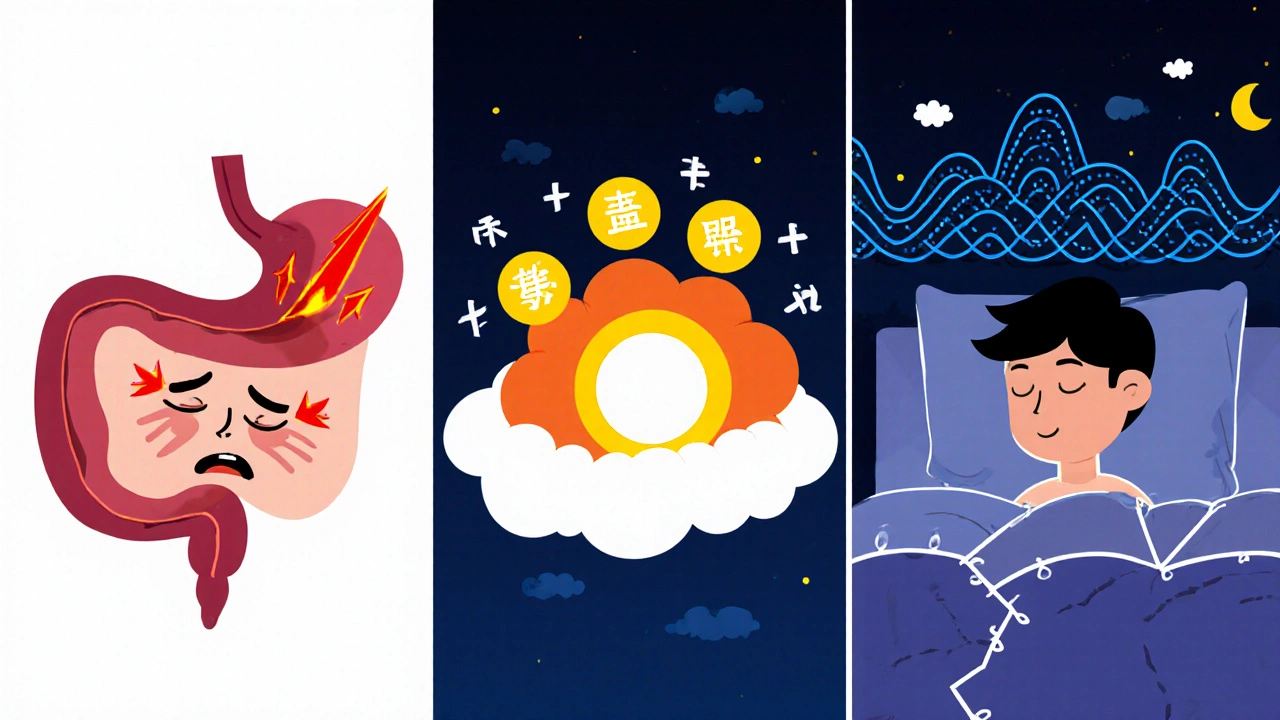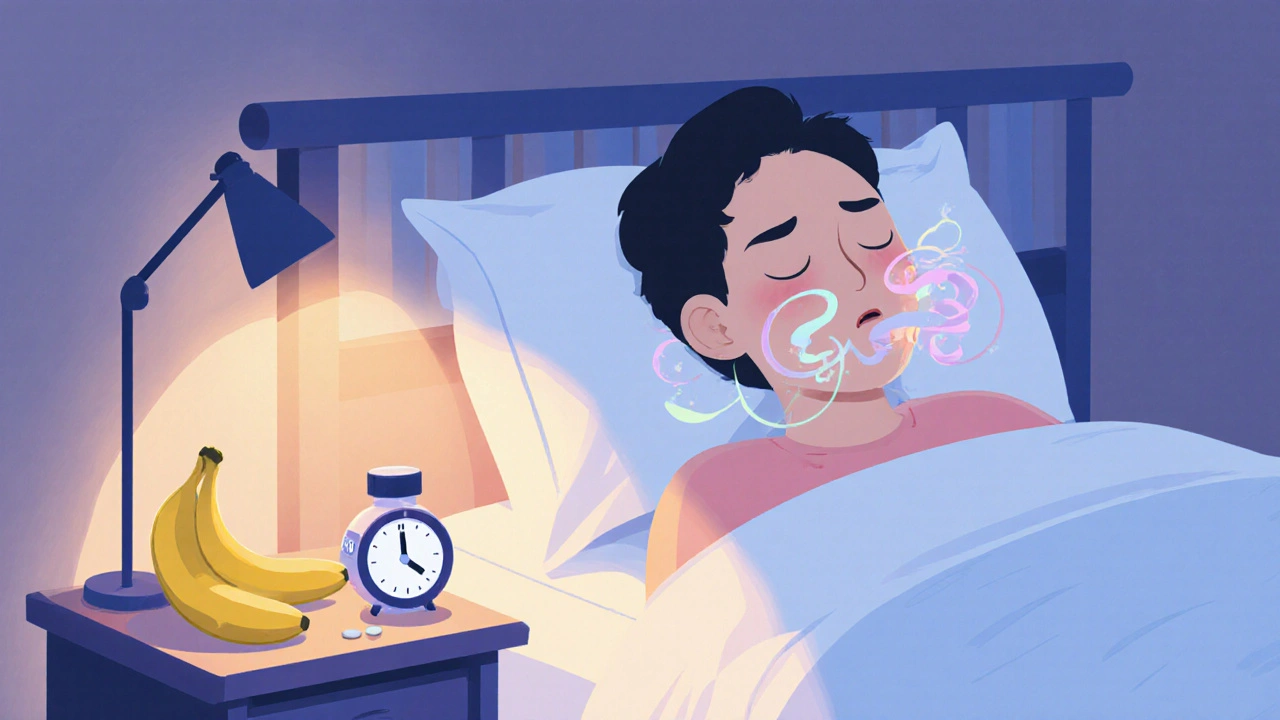Ulcer Sleep Disruption Estimator
Assess Your Sleep Impact
Answer these questions based on your symptoms over the past week to estimate how much your ulcer is disrupting your rest.
Key Takeaways
Quick Takeaways
- Peptic ulcers trigger night‑time pain that wakes you up and reduces deep‑sleep stages.
- Disrupted sleep fuels daytime fatigue, creating a vicious cycle.
- Identifying ulcer type (gastric vs duodenal) helps target treatment that improves rest.
- Simple lifestyle tweaks-meal timing, stress control, and proper medication-can restore sleep quality.
- Seek medical advice if pain persists more than two weeks or if you notice weight loss, vomiting, or black stools.
Ever lie in bed, stare at the ceiling, and feel a gnawing pain in your upper abdomen? That’s a classic sign that an ulcer is messing with your night’s rest. In this article we’ll unpack exactly why ulcers can turn a good night’s sleep into a series of restless awakenings and leave you drained by sunrise.
What Is a Peptic Ulcer?
Peptic ulcer is a breakdown of the stomach or duodenal lining that creates an open sore, usually caused by excess stomach acid, Helicobacter pylori infection, or chronic use of NSAIDs. The ulcer can sit in the stomach (gastric ulcer) or the first part of the small intestine (duodenal ulcer). Both locations share the same pain‑triggering mechanism: an exposed layer of tissue that reacts to food, acid, and stress.
How Ulcers Disturb Sleep Quality
Sleep isn’t just a block of time; it’s a series of stages that let the brain and body recover. When an ulcer flares up at night, it interrupts this process in three main ways:
- Acid reflux and pain spikes. Lying flat makes acid flow upward, irritating the ulcer and causing sharp pain that can wake you.
- Hormonal disruption. Pain triggers cortisol release, which suppresses melatonin, the hormone that signals the body to sleep.
- Fragmented REM cycles. Even brief awakenings prevent the brain from entering deep REM sleep, the stage responsible for memory consolidation and mood regulation.
Research from the European Gastroenterology Journal (2023) showed that patients with active peptic ulcers spent 30‑45% less time in deep sleep compared to healthy controls.
Why Fatigue Follows Poor Sleep
When sleep quality drops, the body’s energy reservoirs are not fully replenished. The result is a feeling of persistent tiredness that’s not fixed by a cup of coffee. Fatigue linked to ulcer‑related sleep loss has two drivers:
- Fatigue a state of chronic tiredness, reduced motivation, and diminished physical performance. The brain’s prefrontal cortex, which governs attention, receives fewer restorative signals, leading to mental fog.
- Inflammatory markers (like IL‑6) rise during ulcer flare‑ups, and these cytokines are known to cause "sickness behavior"-the body’s way of telling you to rest.
One 2022 clinical trial found that ulcer patients reported an average fatigue score 2.3 points higher on the Visual Analogue Scale for Fatigue than non‑ulcer patients, even after adjusting for age and comorbidities.

Types of Ulcers and Their Sleep Impact
| Characteristic | Gastric Ulcer | Duodenal Ulcer |
|---|---|---|
| Typical pain timing | Worsens after meals, often night‑time | Improves after meals, peaks 2‑3h post‑dinner |
| Acid exposure during sleep | High (acid pools in stomach) | Moderate (acid moves into duodenum) |
| Common sleep disturbance | Frequent awakenings | Occasional early‑morning pain |
| Response to bedtime PPI | Strong improvement | Variable; may need additional H2‑blocker |
Understanding whether you’re dealing with a gastric or duodenal ulcer guides the timing of medication and the choice of lifestyle measures.
Key Players Behind Ulcer‑Related Sleep Problems
Several biological and behavioral factors amplify the ulcer‑sleep link.
- Helicobacter pylori a bacterium that colonises the stomach lining and triggers inflammation, increasing ulcer risk. Infection can cause night‑time acid spikes that worsen pain.
- Proton pump inhibitor a class of drugs that suppress gastric acid production, helping ulcer healing and reducing nocturnal pain. When taken 30‑60minutes before bedtime, PPIs can dramatically improve sleep continuity.
- Stress psychological pressure that boosts cortisol and can increase stomach acid output. Chronic stress perpetuates the ulcer‑fatigue cycle.
Practical Steps to Restore Sleep
Below is a checklist you can start using tonight.
- Meal timing. Finish your last solid meal at least 3hours before bed. Light snacks like a banana or plain toast are fine.
- Elevate the head of the bed. A 6‑10cm incline reduces acid reflux that can aggravate the ulcer.
- Medication schedule. If your doctor prescribes a PPI, take it in the early evening. For H2 blockers, follow the label-usually 30minutes before sleep.
- Stress‑reduction routine. Try a 10‑minute breathing exercise or gentle yoga before bedtime to lower cortisol.
- Avoid irritants. Cut caffeine after noon, limit alcohol, and skip NSAIDs unless directed by a physician.
- Monitor symptoms. Keep a sleep‑pain diary for a week. Note pain intensity, time of awakening, and any foods/drinks consumed.

When to Seek Professional Help
If you notice any of the following, book an appointment promptly:
- Severe, unrelenting night‑time pain that wakes you multiple times.
- Unexplained weight loss or loss of appetite.
- Vomiting blood or noticing black, tar‑like stools (signs of bleeding).
- Persistent fatigue despite adequate sleep duration and good sleep hygiene.
Early diagnosis often involves an endoscopy, a breath test for Helicobacter pylori, and possibly blood tests for anemia.
Long‑Term Outlook
With proper treatment-often a combination of antibiotics (if H.pylori‑positive), PPIs, and lifestyle tweaks-most ulcers heal within 6‑8weeks. As the ulcer resolves, sleep patterns typically normalize, and fatigue recedes. However, recurring ulcers can re‑ignite the cycle, so maintaining good sleep hygiene and regular medical check‑ups is essential.
Bottom Line
Ulcers are more than a tummy ache; they sabotage the night’s restorative power and drain you during the day. By recognizing the signs, treating the underlying cause, and adopting sleep‑friendly habits, you can break the ulcer‑fatigue loop and get back to feeling rested.
Frequently Asked Questions
Can a mild ulcer affect my sleep?
Yes. Even a mild ulcer can cause occasional nighttime pain or acid reflux, which can interrupt sleep cycles and leave you feeling unrested.
What’s the best time to take a proton pump inhibitor for sleep?
Take the PPI 30‑60 minutes before your evening meal or about two hours before you go to bed. This timing maximises acid suppression during the night.
Is caffeine a trigger for ulcer‑related insomnia?
Caffeine stimulates stomach acid production, which can aggravate ulcer pain and make it harder to fall asleep. Limit coffee, tea, and soda after noon.
How long does it take for sleep to improve after ulcer treatment?
Most patients notice reduced nighttime pain within 1‑2 weeks of starting PPIs or H.pylori eradication therapy. Full sleep restoration usually follows ulcer healing, around 6‑8 weeks.
When should I worry about ulcer‑induced fatigue?
If fatigue persists despite 7‑8 hours of sleep, or if you also experience weight loss, vomiting, or black stools, seek medical attention immediately.

Joanna Mensch
October 17, 2025 AT 18:18They don't want you to know that the ulcer‑induced insomnia is part of a hidden pharma experiment.
RJ Samuel
November 9, 2025 AT 20:52Whoa, that sounds like a wild ride, but the science is pretty clear – ulcers crank up acid, and acid loves to mess with your sleep.
Sure, there are stories about conspiracies, yet the data on nocturnal pain is solid.
It's not some secret plot, it's just a painful ulcer doing its thing.
Bottom line: treat the ulcer and the sleep will thank you.
Nickolas Mark Ewald
December 3, 2025 AT 00:25I appreciate the thorough overview, especially the practical tips about meal timing and head elevation.
Those simple changes can really make a difference for many people.
Chris Beck
December 26, 2025 AT 03:58Honestly this article is just another attempt by foreign med‑companies to push their pills!! British people know real remedies come from good old diet and hard work!! Stop listening to strangers!!
Emily Rankin
January 18, 2026 AT 07:32Imagine the night as a restless ocean, each wave of ulcer pain lashing against the fragile hull of our dreams, threatening to sink us into abyssal fatigue.
When the stomach's lining is torn, the mind becomes a ship without a compass, drifting under the moon's indifferent gaze.
The cortisol surge acts like a storm, shattering the gentle lull of melatonin that should cradle us into restorative slumber.
Each gasp for breath in the dark is a reminder that the body is fighting an unseen foe.
Yet hope is not lost; the ancient wisdom of timing meals three hours before bed is a lighthouse guiding us to safer shores.
Elevating the head of the bed sets a barrier, a levee against the tide of acid that seeks to flood our peace.
Proton pump inhibitors, when taken as prescribed, are like steadfast sentinels, holding back the corrosive onslaught.
Stress, that insidious whisper, fuels the fire, but a simple breathing ritual can quell its flames.
Consistent monitoring, a diary of pain and sleep, becomes a map, revealing patterns we can navigate.
When ulcer pain subsides, the night restores its rhythm, and the body awakens renewed, no longer a husk of fatigue.
The cycle of disruption can be broken, replacing dread with the gentle hum of recovery.
Remember, the body is resilient; with proper care, the sore will heal, and with it, the shadows that stole our rest.
Each sunrise after healing is a triumph, a testament to the power of mindful choices.
So let us seize these practical steps, honor our bodies, and reclaim the quiet sanctuary of sleep.
In doing so, we not only mend an ulcer but also rewrite the story of our days, turning fatigue into vigor.
Rebecca Mitchell
February 10, 2026 AT 11:05That was a solid read i think it really hits the mark and the suggestions are spot on